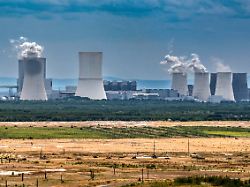More than a trillion subsidies
G20 countries are producing oil, gas and coal like never before
November 22, 2023, 4:19 a.m
Listen to article
This audio version was artificially generated. More info | Send feedback
Officially, many G20 countries want to push ahead with the transformation of their energy production. In fact, states are subsidizing fossil fuels more than ever before. According to a report, the trillions could have been used to promote solar energy on an immense scale.
G20 countries granted record levels of fossil fuel subsidies last year, according to a report. Against the backdrop of rising energy prices, state governments and public companies more than doubled their subsidies in this sector in 2022 to almost $1.3 trillion (1.19 trillion euros) compared to the previous year, according to a report by BloombergNEF ( BNEF).
The 19 states of the G20 group, which also includes the European and African Union, were considered. According to the information, around $830 billion flowed into price supports for consumers. According to the BNEF report, the rest went to gas, oil and coal producers, “even though many of them made record profits.”
In 2021, the subsidies were $583 billion. For the current year, the authors expect a slight decline compared to 2022, but according to the information, the subsidies are likely to be above the level of previous years. For their report, the authors used data from the Organization for Economic Co-operation and Development (OECD) and the International Energy Agency, among others.
Almost two terawatts of solar power is possible
According to the report, the subsidies in 2022 could have financed solar power plants with an output of 1.9 terawatts. This would have corresponded to ten times the capacity installed by the G20 last year.
The report also looks at a carbon price that now exists in 13 of the G20 countries. The authors criticize that many of these programs are inefficient because the price is too low or concessions such as tax exemptions are too large.
The report was published around a week and a half before the UN climate conference COP28 in the United Arab Emirates. From November 30th to December 12th, measures to combat the climate crisis will be discussed in Dubai.
